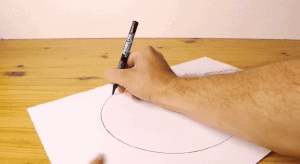Admit it, drawing a perfect circle is one of the hardest things you’ve ever done, right?
Since childhood until now, everyone has certainly had many times sitting and drawing circles by hand. But the round is nowhere to be seen, it’s all distorted.
If you’re frustrated by your clumsiness, forget it. Because this is not your fault at all, but because of the mechanism of the brain.
First of all, it must be said that we can tell if a shape is really round or not quite easily. That’s because the visual cortex has evolved over time to help us discern even the “smallest difference” in details. But drawing circles, by contrast, is much more complicated.
The parts of the brain responsible for drawing the circle are separate from each other, so it is quite difficult for them to work together smoothly, to control the action of the muscles.
The brain, on the other hand, “prefers simplicity,” like controlling the movement of one joint instead of too many at once. Drawing a perfect circle is like forcing the brain to challenge this habit.
Natalia Dounskaia, an associate professor of motor science, explains: “In most arm movements, the shoulder acts like the handle, and the elbow follows. This is similar to the movement of the arm. whip: you actively move the handle and then the whole leash moves passively.”
Dounskaia says: “The circle is one of the most difficult shapes to control. To draw a perfect circle requires the shoulders and elbows to work together well. The brain needs to process a lot of parameters, and it doesn’t have the resources to focus on regulating movement and doing cognitive tasks at the same time.”
However, there are still people who have the ability to draw an ideal circle like we always dreamed of. It was Alexander Overwijk – a math teacher from Ottawa, known as the “World Champion of Circle Drawing”.
Although this is not a real contest, I’m sure everyone will gasp when they see his work below:
Research also shows that artists tend to draw better circles. Perhaps because they are better than the average person at recognizing and correcting errors.
But experts all agree that, if we practice hard, we can completely improve this ability. “Having an iron job, having a good day”, maybe later you can reach the same level as Overwijk?


